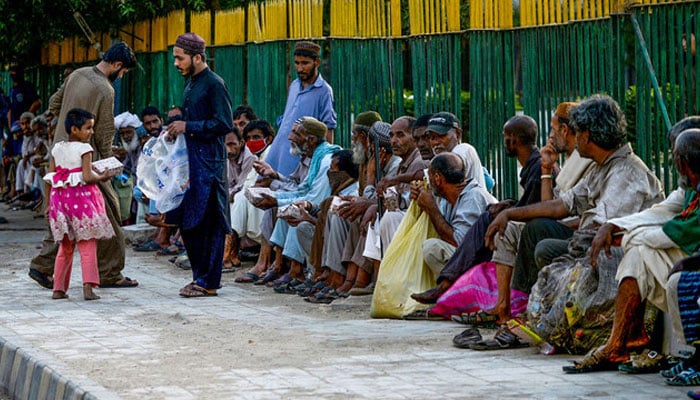How to rescue Pakistan
Surrounded bleak outlook, Pakistan's ruling structure faces major pitfalls that have hampered its ability to rule, let alone reform
August 27, 2025

As Pakistan faces an unfolding disaster from flash floods across the country, its ability to reform and change urgently to meet the challenge remains weak and increasingly in doubt.
Centrally, the status quo that surrounds the conduct of the government at the centre and the provinces only promises to slow down the pace of long-overdue reforms.
In brief, the failure to address these long-term gaps, by default, has only reinforced an agenda geared towards maintaining continuity rather than a robust change. In this journey, halting and reversing the dangerous escalation in climate-related trends remains a distant prospect.
Going forward, changing Pakistan for the better is centrally tied to rescuing the country from the hold of its political elite, who have held back even the remotest hope of progressive change through meaningful reforms.
Surrounded by this bleak outlook, Pakistan's ruling structure, led by Prime Minister Shehbaz Sharif, faces two major pitfalls that have hampered its ability to rule, let alone reform.
First, the failure to take Pakistan onto a focused pathway that succeeds in tackling the most vital challenges has upset the journey towards articulating solutions to key national challenges. Within this desirable journey, Pakistan must oversee fundamental changes, without which it will become virtually impossible to unleash a new reformist agenda.
In a country where the prevalent rate of poverty hovers around 40-45% of the population, the progress towards a qualitatively better future will remain a very distant prospect. In looking at the continuing challenge of poverty, it is important to recognise the downside risk from this gap for the future of Pakistan’s stability.
Pakistan must never ignore the worsening plight of its impoverished population, as herein lies the fodder for fuelling internal dissent and disorder. The history of the world has witnessed many instances where large-scale poverty fuelled dissent and disorder, to the extent that the subsequent chaos just demolished otherwise comfortably placed ruling structures.
Across Pakistan, fundamental human needs, notably access to healthcare, education, providing employment and personal security, are available for the privileged few. But access to the best of such outlets for the poor remains an absent prospect. It is clear that Pakistan has failed to deliver on all of its basic obligations to its population across the board.
Second, Pakistan’s ruling structure should have undertaken a different path to reforming the country than what has been witnessed so far. In stabilising Pakistan's economy under an IMF loan programme worth $7 billion, there has been an all too visible disregard for protecting the poorest of the country's impoverished population.
As Pakistan suffers today in the wake of continuing flash floods across the country, the poorest of the poor must reconcile themselves with the absence of protective structures to ensure a path back to secure livelihoods.
Arguably, the mounting losses witnessed year after year from climate change-related events must be seen through the prism of growing poverty. This refers back to the growing cost of fuel for cooking purposes, which has forced large communities in the countryside to rely on cutting trees for use as firewood.
In this process, the loss of Pakistan’s forest land has only contributed to environmental degradation as never before. In the process, Pakistan has suffered badly through deforestation, while much-needed reforestation has failed to keep pace with the removal of trees in the first place.
Associated with the consistent growth of poverty, other regressive trends include a continuing decline in the quality of government-provided healthcare and educational services all across Pakistan. Within this journey, the government’s failure to unveil policies that support the agricultural sector has further undermined prospects for a rapid lift in food security all across Pakistan.
In the short term, the provincial government of Punjab must be held responsible for the loss of incomes of Pakistan's farmers, leaving many with larger debts than before.
This relates to an unprecedented letdown by the Punjab provincial government in spring 2024, when the price of wheat crashed in the local market after the withdrawal of a promised support price to farmers. Consequently, the combination of that policy failure and weather-related disasters has pauperised the already impoverished segment of farmers.
The emergency of today is large enough to warrant an immediate halt to fanciful projects, notably by the Punjab government. The pursuit of high-speed train services smacks of either a poor understanding of Pakistan's grassroots reality or a complete disregard for the plight of the poor. Besides, a continuing pursuit of high-speed motorways appears to disregard the mounting threat from increasing food insecurity across Pakistan.
Eventually, rescuing Pakistan from its present trajectory must be led by reversing fanciful ideas, as the people of the country suffer. Pakistan’s future must not be allowed to be squandered at the whims of the country’s ruling elite of today.
Disclaimer: The viewpoints expressed in this piece are the writer's own and don't necessarily reflect Geo.tv's editorial policy.
The writer is an Islamabad-based journalist who writes on political and economic affairs. He can be reached at: [email protected]
Originally published in The News











